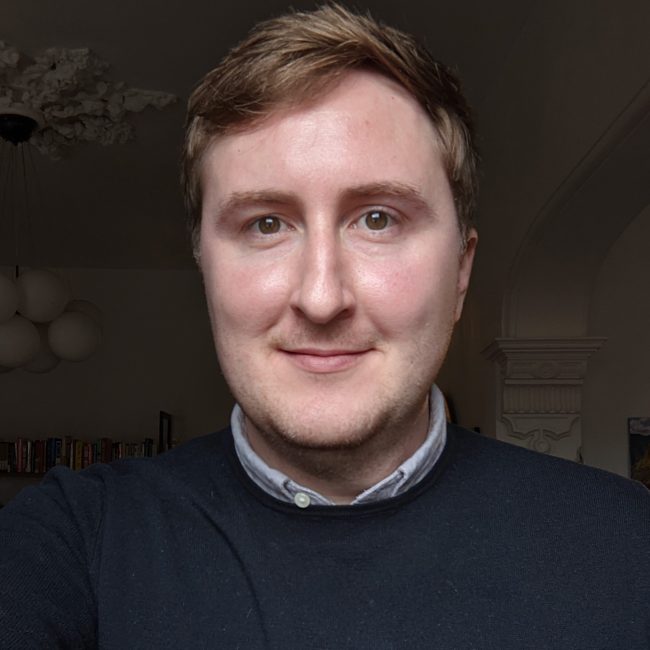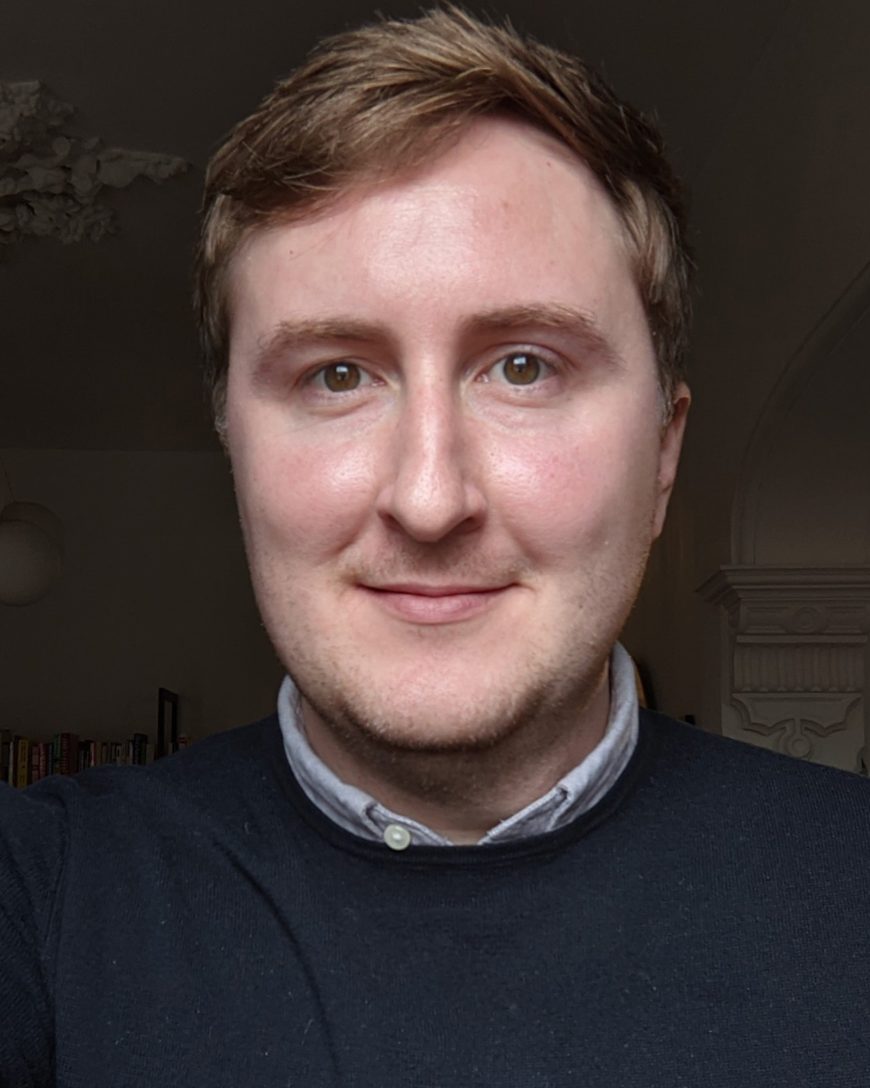Curated conversations with data science for social impact leaders on their career journeys
Pathways to Impact is a series of conversations with data for social impact leaders exploring their career journeys. Perry Hewitt, CMO of data.org, spoke with Evan Tachovsky, Global Director, Data Lab at World Resources Institute, about the interdisciplinary, non-data science path that brought him to his current role in social impact.
How did you first get into social impact? What was your educational or professional background that led you to this work?
Like a lot of data scientists, I came to work in social impact through a lot of twists and turns and experiential learning. For me, that involved bouncing in and out of fields, figuring out what I liked to do technically, and then deciding to use those skills and experience for good.
As an undergrad, I studied political science and psychology. I was intrigued by what we can learn from psychology, and how it might apply to political science. For example, I was interested in cognitive dissonance and how people with strong political views integrate new information that might counter their beliefs. This was back in the MySpace era when social media had not yet had an outsized effect on our political discourse, so I didn’t have all the experimental and empirical options available to explore those questions.
When I graduated, having spent a lot of time working on theory and small-scale experiments, I realized I didn’t actually know much about how politics worked in the real world. In a stroke of luck, I found out my college had an exchange program with a university in Turkey. I spent my last semester in that program and then just ended up staying in Turkey and working a range of odd jobs from English teacher to news wire copyeditor. This put my career on an entirely different path than I’d ever planned.
Over the next five years, I bounced around the Middle East, Caucasus, and DC working on human rights and media freedom as a researcher and program manager. This was during and after the Arab Spring and it was an incredibly heady time where massive change—both a positive and negative sense—felt quite possible. On a personal level, I valued the opportunity to do this work and credit this period in my career with giving me solid project management skills and confidence operating in extreme ambiguity.
Across these jobs, I started to naturally gravitate toward quantitative and technical work. I had some knowledge of statistics from undergrad and wasn’t afraid of computers, which meant I was often the person who was assigned to tackle technical projects. This led to some unique opportunities to pair data and technology with social good efforts. In Iraq, I had the opportunity to manage national surveys on media use and public opinion. I helped build a platform that gave citizens journalists a way to publish securely from inside repressive countries. And I did advising on how to run analytics-driven social media campaigns to support social and political rights.
A few years in, I took a step back and realized that it was time to commit to fill in some of the gaps in what I’d learned experientially. Data science was a natural choice for me. As a field, it’s methodologically omnivorous and deeply concerned with practical impact—be it on a business’ bottom line or social impact. I went back to get a master’s in quantitative methods and since then, I’ve been lucky to build and lead some groundbreaking data and technology teams at organizations like Media Development Investment Fund, The Rockefeller Foundation, and now the World Resources Institute.
None of that would have been possible without the time I spent not doing data science in my early career.
At WRI, which part of the data for social impact puzzle are you working on? As you consider how to structure data teams, are there particular social challenges you’re applying those new data approaches to?
WRI has hundreds of amazing researchers and domain experts working to protect and restore forests, improve access to clean energy, and improve resilience for people living in cities around the world. Our job in the Data Lab is to help these experts translate their research into products that inform decisions that matter, enable accountability, and drive the conversation.
WRI has been a data science leader for years and has produced marquee products like Global Forest Watch and Aqueduct. I joined about six months ago and it’s been a real honor to work with our team to build on this strong foundation to take our technical work to the next level. Right now, we’re focused on building a new product studio, expanding our data science capacity with our international offices, and strengthening our data infrastructure and APIs to support the next generation of products that help improve lives, protect nature, and ensure just climate transitions.
What were some unexpected blockers to your career? Which leaps were harder than expected like going back to university or then choosing where to re-enter the workforce?
As someone who loves learning new things and working in new domains, one consistent struggle: it’s very easy to take too big of a bite. It can be overwhelming keeping up with very fast-moving methods at the same time as you’re learning new scientific or business domains. Trying to do it all, know it all, be it all is—ironically—a huge blocker for actual growth and learning.
If you don’t take the time, acknowledge your limitations, and give yourself grace you’re going to burn out. On the flip side, if you admit what you don’t know and give yourself grace, you’ll find you’ll actually learn more and learn the information deeper.
You mentioned you’ve learned how you admit when you don’t know things. Has that changed the culture of the teams you work on, and perhaps made it safer for other people on the team to acknowledge areas for growth?
Absolutely—I think creating safety within a data science team is extremely important because there’s no way everyone can know everything and our job is often to learn as we go. In some ways to be a data scientist at this moment is to always be slightly behind the curve on something. There are so many new frameworks, languages, approaches, and papers to keep up on that if you don’t operate from the perspective of “you’re welcome here, you’re valid here, your work is important here,” people will get exhausted. Something I’ve always aspired to—and try to follow through on—is creating space for people to learn new technologies with the expectation they’re going to need time and energy to learn them, integrate them, and apply them.
Part of the Pathways to Impact series
Modeling these areas for growth and practice of intentional learning for the team seems very powerful.
I agree. One of the biggest shifts I’m seeing in “data for good’ is the shift from lone data scientists working in ‘hero mode,’ to diverse teams building and learning together. Once you start working in teams it becomes quickly apparent just how much you can learn from your peers and how that allows you to scale up your work.
What community of people or resources bolsters your work? When you’re stumped, where do you go, and who helps?
I’ve always learned a great deal from two groups. First, I’ve learned so much from the data journalism community. I’m not a journalist myself, but the way they use data science to collect data from really messy sources and communicate those data clearly through visualization has consistently motivated me and informed my approach. The presentations at conferences like NICAR have helped me to stay up-to-date on new techniques and see imaginative ways to use data science to understand the world around us.
Second, coming from a quantitative methods background, I have always really appreciated the R and specifically the Tidyverse community. The people around R gave me a leg up in learning statistics and data visualization. I’ve always appreciated the way they’ve approached community building and knowledge sharing. It feels very open, warm, encouraging, and practical.
As much as possible, I’d encourage you to put your ideas, code, and work out there. Be open to feedback and you’ll learn and grow.
Evan Tachovsky Global Director, Data Lab World Resources Institute (WRI)
How much of that community interaction is in person these days?
I’m living in a largely remote world right now. A majority of my team is remote as are many of our collaborators. Like any community, we have to sustain and support it and that doesn’t happen without intent. But when you get it right, I think it’s very much possible—and even preferable—to build teams that aren’t all working next door to each other all the time.
What non-data science skillset has offered the greatest return in your work? What’s your superpower?
Comfort with ambiguity. I’ve always really enjoyed the part of projects where things are the most fluid and dynamic. In a fast-moving field like data science and in a world where new crises emerge and overlap this inclination is really helpful.
What advice do you have for someone new to the field, but who’s interested in doing this work?
Find a topic you’re passionate about and then apply data science to that topic. That will drive your technical development more than trying to learn Python or R in abstract. If you’re really passionate about the environment and health, grab some air quality data from Resource Watch and build a map. If you’re passionate about politics, build a topic modeler for political speeches. Solving a concrete problem that you’re interested in is the fastest way to learn.
Another piece of advice: data scientists, myself included, can have a real perfectionist streak. This often prevents us from finishing projects or sharing what we’re working on. As much as possible, I’d encourage you to put your ideas, code, and work out there. Be open to feedback and you’ll learn and grow.
One of the biggest shifts I’m seeing in “data for good’ is the shift from lone data scientists working in ‘hero mode,’ to diverse teams building and learning together.
Evan Tachovsky Global Director, Data Lab World Resources Institute (WRI)
What do you see as a big development in data for good in the next decade?
There are so many exciting things happening right now. A big one for us at World Resources Institute is all the new sensors available to help us understand the world. In the sky, we have new satellites feeding us optical, radar, and hyperspectral data that help us see how environmental, agricultural, and societal systems are changing. On the ground, we have tools like low-cost air quality sensors that allow us to understand hyperlocal environmental impacts.
The second thing I’m really excited about is that the toolkit for doing data science is getting so much more user-friendly and accessible. Previously, there were all these frustrating, under-the-hood steps when it came to setting up a data science environment. Now there is a range of amazing tools and platforms that abstract a lot of the annoyance away. On the geospatial side, platforms like Google Earth Engine, and Microsoft Planetary Computer really make life easier for analysts. I’m really excited about doing data science in the browser through the combination of traditional data science tools like Python and R combined with WebAssembly. Replit is another great example of this trend. The idea of doing data science in your browser is the dream for me. This will really expand who can be a data scientist and who can benefit from these approaches.
What’s your don’t miss daily or weekly read? It could be a data science topic, or something entirely different.
I must confess that I sink too much time into Twitter but at the end of the day it’s probably the place where I learn the most. I also subscribe to way too many newsletters. Two I’m enjoying right now are Bob Rudis’ Daily Finds and Jeffrey Ding’s ChinAI newsletter.
At WRI, I’m lucky to get to work with a lot of smart people who are extremely well-read, so I get to draft off their knowledge and expertise. We have an internal Data Lab newsletter that I edit every month that has a “must-read” section and that’s probably where I see the highest density of great papers, great articles, and great insights.
About the Author
Perry Hewitt is the Chief Marketing and Product Officer of data.org where she oversees the marketing and communications functions, as well as digital product development.
Read moreSeries
Pathways to Impact
This data.org series interviews leaders in Data Science for Social Impact with a lens of how they got there, as well as the skills and experiences that have fueled their career progression.
data.org In Your Inbox
Do you like this post?
Sign up for our newsletter and we’ll send you more content like this every month.
By submitting your information and clicking “Submit”, you agree to the data.org Privacy Policy and Terms and Conditions, and to receive email communications from data.org.


